When cooking meat outdoors, you'll need to follow five critical safety practices. Always maintain proper temperature control using reliable thermometers, aiming for 225-325°F on your grill with both direct and indirect heat zones. Keep raw and cooked foods separate to prevent cross-contamination, using clean utensils and plates. Store your meat properly below 40°F in airtight containers, away from sunlight and moisture. Marinate meats according to specific timing guidelines, and never reuse marinade that's touched raw meat. Finally, verify your grill is thoroughly cleaned before and after use. These fundamentals will set you up for safe and successful outdoor cooking adventures.
Temperature Control and Testing

While grilling and smoking meat might seem straightforward, mastering temperature control is essential for both food safety and ideal results.
Set up your grill with two zones: a hot direct zone and a cooler indirect zone around 225-325°F, depending on your meat type.
You'll need reliable thermometers to monitor both cooking and internal meat temperatures.
Insert your digital probe into the thickest part of the meat, avoiding bone, and take multiple readings for accuracy.
Remember that meat continues cooking after you remove it from heat, so pull it 5-10°F below your target temperature.
To maintain stable temperatures, keep your lid closed and use water baths in smokers to prevent fluctuations.
If you're using a smoker, control airflow by adjusting the bottom vent first, then fine-tune with the top vent. For optimal crust development and flavor, low and slow cooking at 225°F can take up to 12 hours.
Avoid Cross Contamination
Since cross-contamination poses one of the biggest risks in meat preparation, you'll need to establish clear boundaries between raw and cooked foods.
Never use the same plates, cutting boards, or utensils for raw and cooked meats without thoroughly cleaning them first. Using hot soapy water to clean your utensils between uses will help prevent harmful bacteria transfer.
When marinating, set aside a portion of clean marinade for basting cooked foods.
Don't reuse marinade that's touched raw meat unless you boil it first. You'll want to keep separate brushes for raw and cooked meats to prevent bacterial transfer.
Keep your hands clean by washing them with soap and hot water before and after handling raw meat.
Use paper towels instead of reusable cloths for cleanup, and bring extra cleaning supplies for outdoor cooking.
Remember to clean your grill brush regularly and avoid reusing any packaging that's contacted raw meat.
Smart Meat Storage Practices
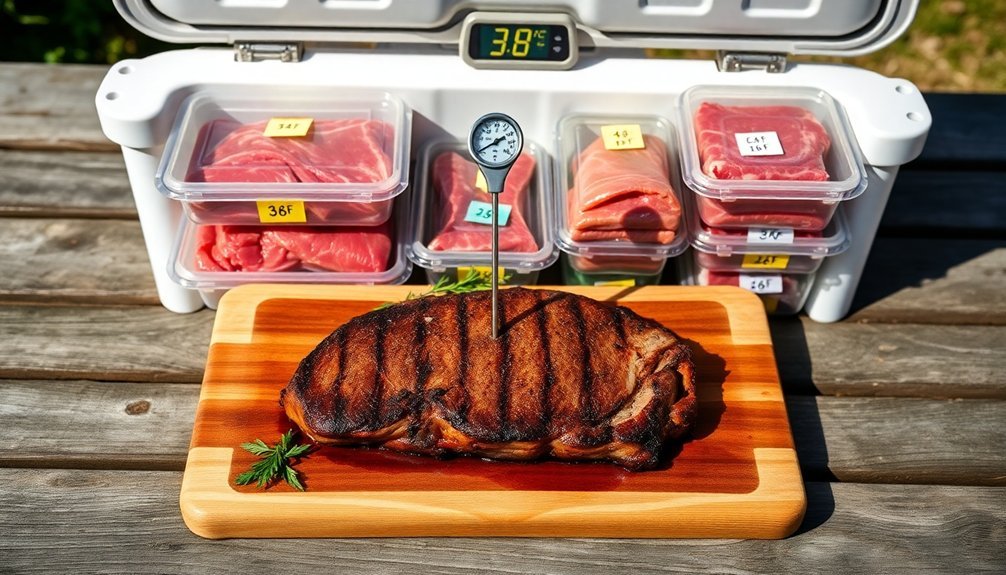
Proper storage complements safe handling practices to guarantee your meat stays fresh and safe to eat. Store your meat in airtight containers, with vacuum sealing and Mylar bags being top choices for dehydrated meats.
Consider adding breadcrumbs to ground meat before dehydrating to improve texture.
For camping trips, opt for durable plastic containers that won't break during transport.
Keep your meat in cool, dry places below 40°F, away from direct sunlight and moisture. If you're storing food outdoors, use bear-proof canisters or hang bear bags to protect against wildlife.
For long-term storage, add oxygen absorbers to Mylar bags or freeze your dehydrated meat to extend its shelf life considerably.
Don't forget to label your containers with the meat type and date. Regularly check stored meat for any signs of spoilage, and divide leftovers into smaller portions for efficient cooling.
Proper Marinating Methods
Mastering marinades begins with understanding their essential components and proportions.
You'll need salt to enhance flavor and tenderize, oil to distribute seasonings, and acid like vinegar or citrus to break down tissues. Add soy sauce for umami depth and a touch of sweetener to promote caramelization.
To marinate effectively, pierce your meat with a fork and place it in a zip-lock bag or sealed container. Always marinate in the refrigerator, following specific timing guidelines:
- 4-24 hours for beef,
- 2-6 hours for chicken,
- 4-12 hours for pork,
- 4-8 hours for lamb,
- and just 15-30 minutes for seafood.
Don't reuse marinade that's touched raw meat, and if you want to use it as a sauce, set aside a portion before adding the meat.
Clean Grilling Techniques
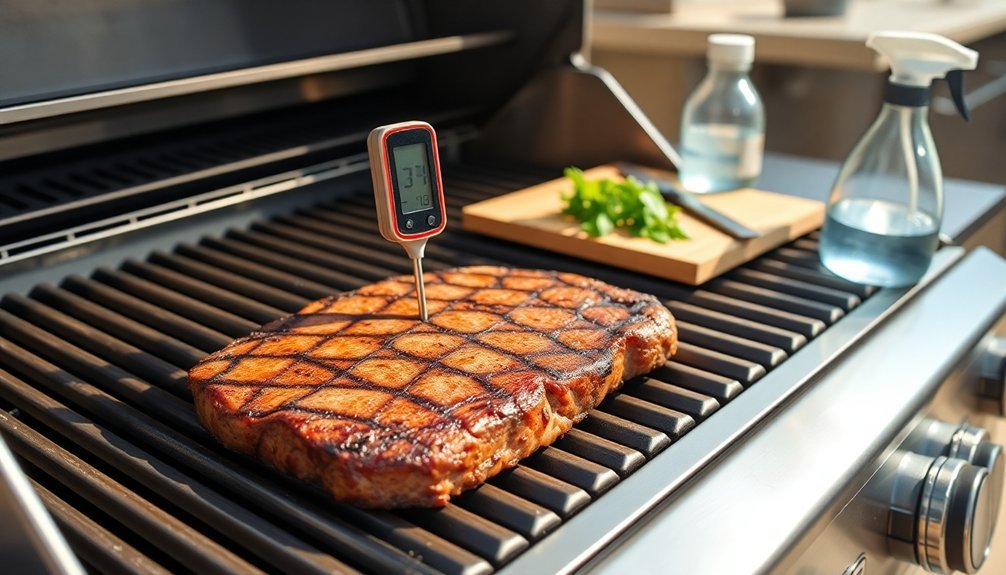
Maintaining a clean grill is essential for both food safety and flavor. Before you start grilling, scrub your grates thoroughly with a bristle-free brush or crumpled aluminum foil to remove any residue. For stubborn buildup, create a paste using vinegar and baking soda rather than harsh chemicals that can affect your food's taste.
For your gas grill, heat it up first to singe off residue, then clean the burner tubes and control knobs. Don't forget to soak the grates and flavorizer bars in warm, soapy water.
When cleaning the exterior, use a stainless steel cleaner but avoid direct sunlight to prevent streaking. After cleaning, lightly oil the grates with a paper towel to prevent sticking, and let your grill develop a seasoned surface over time for better temperature control.
Frequently Asked Questions
Can I Reuse Aluminum Foil Packets for Grilling Different Meats?
No, you shouldn't reuse aluminum foil packets. They can leach toxic particles into your food, retain harmful bacteria, and lose structural integrity. It's safer to use fresh foil or try alternatives like parchment paper.
How Long Should I Wait Before Cleaning My Grill After Cooking?
You'll get the best results if you clean your grill while it's still warm, around 400°F, just after cooking. Don't wait too long, as food residue will harden and become harder to remove.
What Should I Do if My Meat Thermometer Breaks During Grilling?
If your meat thermometer breaks, you can use alternative methods like checking meat color, texture, or the finger test. You'll also want to check juices and cooking time guidelines to guarantee proper doneness.
Is It Safe to Partially Grill Meat and Finish Cooking Later?
No, you shouldn't partially grill meat and finish later. It's unsafe as bacteria can grow during cooling and storage. If you need to pre-cook, either cook it completely or transfer immediately from partial cooking to final grilling.
Can I Use the Same Spice Rubs on Raw and Cooked Meats?
You shouldn't use the same spice rub on raw and cooked meats. It'll cause cross-contamination. Instead, set aside a portion of your rub before seasoning raw meat, or use a fresh batch for cooked meats.
In Summary
You've learned essential tips for safely cooking meat outdoors. By controlling temperature, preventing cross-contamination, storing properly, marinating correctly, and maintaining clean grilling practices, you'll keep your outdoor cooking safe and enjoyable. Remember, food safety doesn't stop at home – it's even more vital when you're cooking outside. Apply these methods consistently, and you'll serve up delicious, safely-prepared meals every time.

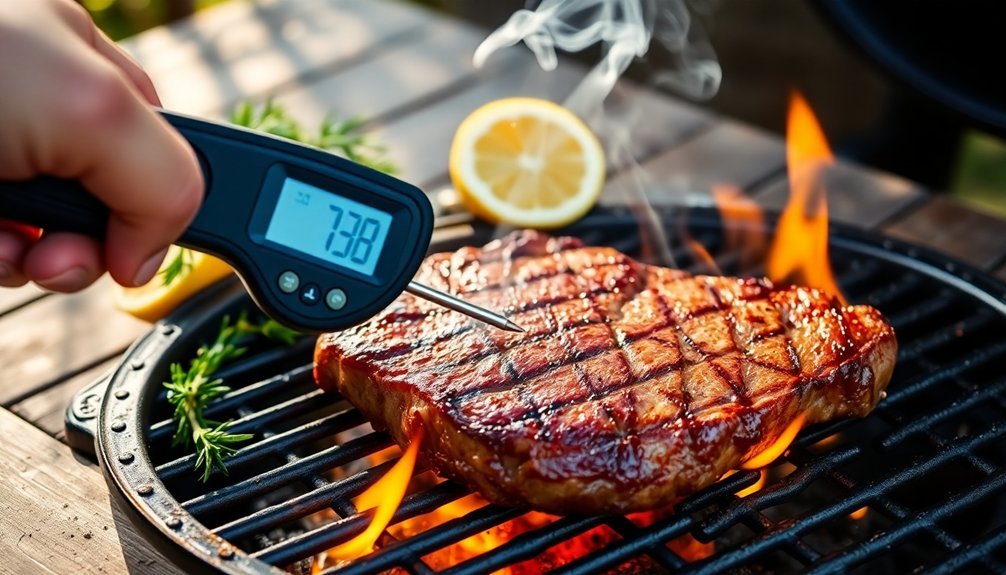
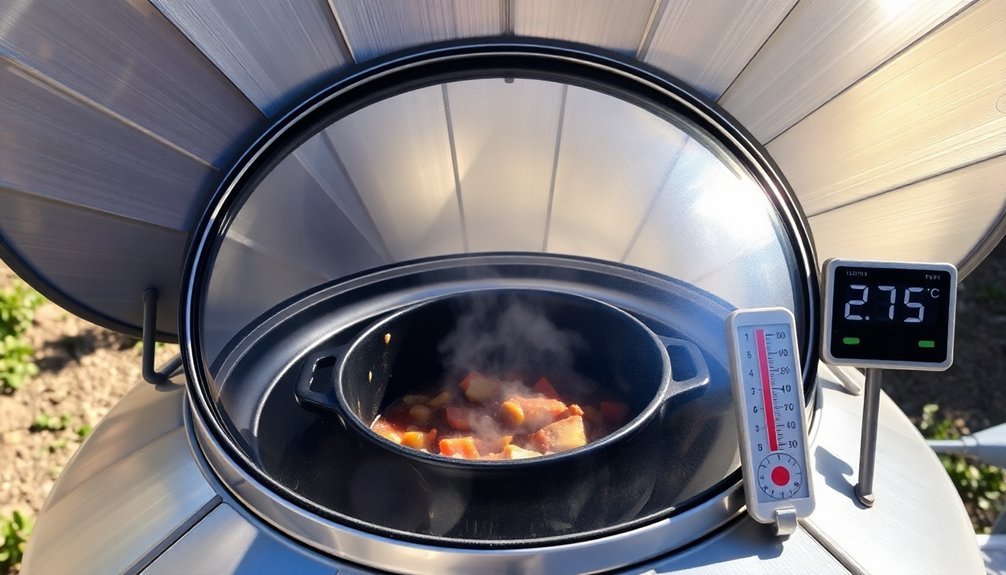
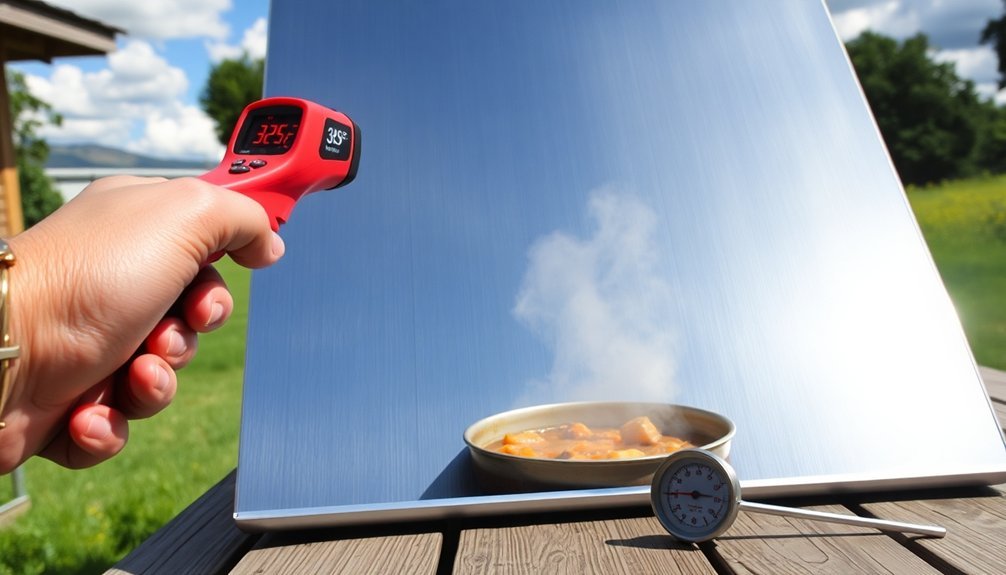
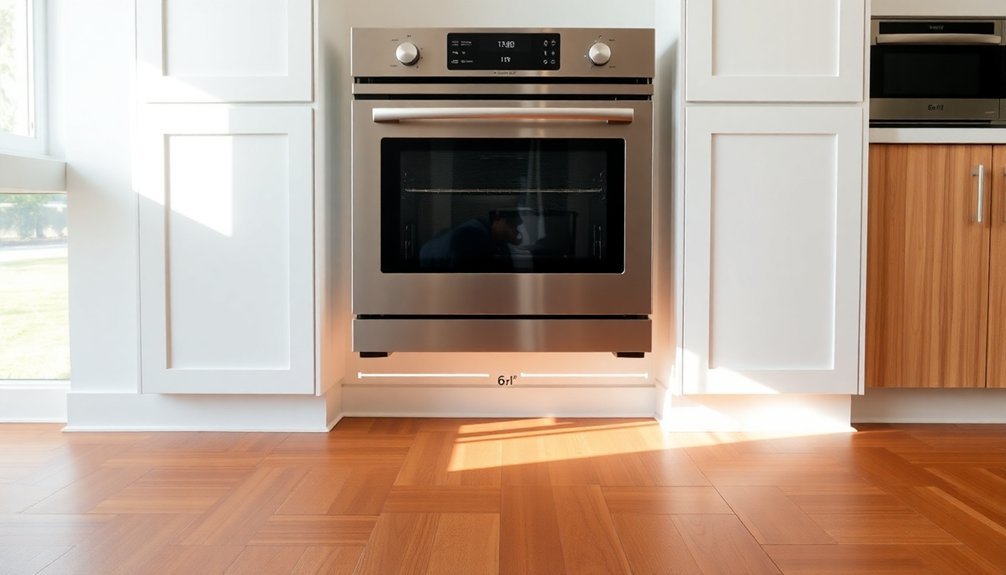
Leave a Reply